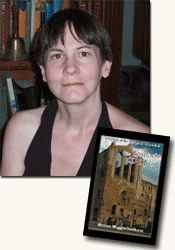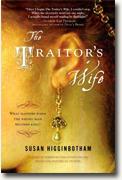author interview
book reviews:
· general fiction
· chick lit/romance
· sci-fi/fantasy
· graphic novels
· nonfiction
· audio books
· author interviews
· children's books @
curledupkids.com
· DVD reviews @
curledupdvd.com
newsletter
win books
buy online
links
home
for authors
& publishers
for reviewers

|
|||||
 
[Author Susan Higginbotham shares her thoughts on the challenges and rewards of historical research, court intrigue, and the vagaries of fate with curledup.com's Luan Gaines] Interviewer Luan Gaines: What first attracted you to Edward IIís reign and his relationship to Eleanor de Clare and Hugh le Despenser? Susan Higginbotham: I first read Christopher Marloweís play about Edward II in graduate school. Though I enjoyed reading it at the time, I didnít think much more about it until I happened across the play online years later. Upon re-reading it, I became intrigued by the historical background to it, and especially by the character of Hugh le Despenser the younger. It wasnít until well into my research that I even realized that he had a wife, Eleanor de Clare. I first became fascinated by her when I realized that her second husband was one of the men who had captured her first husband. It seemed such a strange thing, I started looking deeper into her background, and soon I realized that I had to tell her story. It seemed made for historical fiction: loyalty, betrayal, and several spins of the wheel of fortune. Is there much historical debate about the relationship of Edward II and Hugh le Despenser? Thereís no question that Edward II was deeply devoted to Hugh and that his affection enabled Hugh to wield great power. What is debatable is whether the relationship was a sexual one. The chronicler Froissart states openly that Hugh was ďa sodomite, even with the king,Ē but Froissart was writing years after the fact and isnít always reliable. (He was, however, close to Hughís grandson Edward, so it seems unlikely that he would have made such a statement without believing in its truth.) There are contemporary allegations of sodomy on Edward IIís part, but they are rather vague and could easily have been slanders.
Even after Edward marries Isabella, Eleanor enjoys a singular position at court, close friend of the king and wife of Hugh the younger, reaping the rewards of these relationships. Does she never consider the pitfalls of her position? I didnít conceive of Eleanor as a particularly introspective character, but as a somewhat naive one and as someone who preferred to believe the best of those she loved. In that way, I think she is like a lot of people, then and now. Edward isolates himself with his closest companions, first Piers Gaveston and later Hugh le Despenser, plundering the kingdom for them. Yet he is repeatedly unsuccessful in military matters. What exactly are Edward IIís contributions to the country during his reign? His contributions, unfortunately, were largely negative in that there was constant strife during his reign. On the other hand, he did inherit many problems, such as the problems in Scotland, from his father, and throughout his reign he was facing a very charismatic and unifying leader in Robert the Bruce.
In my estimate of her, she probably didnít go to France with the intention of betraying her husband, but took an opportunity where she found it. Although selfish and arrogant, Hugh le Despenser is certainly a fascinating protagonist, although even his charm fails him at the end. In your opinion, is he truly such a villain? A traitor? He certainly did some very wrong acts, especially when vulnerable women like his sisters-in-law were involved, so he was a villain in that respect. I wouldnít call him a traitor, because he was loyal to the king, though certainly there was some self-interest involved in that loyalty too.
The favor of the English throne is often dangerous, if heady, as Eleanor learns after Hughís death and Edwardís imprisonment. How precarious is her position with no male relatives to protect her and her children? A womanís position in such circumstances was very precarious, especially if she had landsóEleanorís own husband had exploited widows in similar situations, including Eleanorís sister Elizabeth. Even in times of domestic harmony, heiresses were prey to fortune-hunters who might abduct and marry them, although in some cases there was collusion involved on the womanís part. On the other hand, it was possible for a woman to live very independently and very comfortably as a widowóEleanorís sister Elizabeth again comes to mind, once Hugh le Despenser was no longer a threat to her. No one during Edward IIIís reign seems to have tried to press her into marriage, although she was still relatively young at the beginning of the reign and must have posed a temptation to some men. Perhaps she just had a good security system! Even crueler than the queenís revenge on Hugh le Despenser is her callousness towards Eleanor, separating Lady Despenserís three young daughters from her to take the veil in different convents. What is the significance of this act? Are the girls trapped forever behind convent walls with no recourse? We had an interesting discussion about this subject on my blog. Itís unclear what Isabellaís motives were, but she had alternatives to forcing the girls to take the veilóshe could have lodged them in convents as boarders, as Edward II himself had done with Roger Mortimerís daughters, or, if she didnít want to be burdened with their expense, she could have sent them to live with some of their relatives, such as their aunts on their fatherís side. So I tend to think she was motivated by spite toward the Despenser family.
Ian Mortimer points out in his biography of Roger Mortimer that most people were scared of Roger Mortimer, who had a huge retinue of armed men who followed him on his travels. And when a wealthy, influential earlóHenry, Earl of Lancasteródid attempt to challenge Mortimer, he soon found himself deserted by his allies and had to surrender. There was also the problem that anyone who challenged Isabella and Mortimer could be accused of challenging the kingówhich meant that any effective opposition to them had to come from the king himself. Eleanorís second marriage to William Zouche is challenged by a younger suitor, who claims he is her real husband. How are such problems resolved, in the court or by the Church? Why does Sir John Grey pursue Eleanor after she has wed and had a child with her second husband? The ecclesiastical courts had jurisdiction over marriage disputes such as the one here. Itís interesting to note that Eleanorís first cousin Joan of Kent, the daughter of the Earl of Kent in The Traitorís Wife, would herself become involved in a similar dispute in the 1340s. No one knows what John de Grey was thinking in real life, but it's likely Eleanor's lands were her most potent attraction. As her husband, John would have had the right to control her considerable property during her lifetime, and if he and Eleanor had had a child together, John would have been entitled to a life estate in her lands if he outlived Eleanor. What are mainprisors? Their purpose? They were people into whose custody an imprisoned person could be released, after which they would then have the responsibility of producing that person to appear to face charges. Being released on mainprise was similar to being out on bail. What was the most difficult challenge in writing this novel? The most rewarding? The research was challenging, but a lot of fun. Thereís no biographical study of Hugh le Despenser, much less Eleanor, so I had to dig through many, many books looking for the occasional mention of Eleanor. It was always great to go to the library and find something about her. I remember being thrilled to find Anne Crawfordís Letters of Medieval Women, which included two written by Eleanoróor, more likely, dictated by her to a clerk.
Eleanor, without a doubt. She faces situations that in our society would put many women in therapy for the rest of their lives, and she does so without becoming bitter or losing her faith or her essential optimism. Are you working on another novel? If so, can you share something about it with us? Iím working on one about Eleanorís oldest son, Hugh, and his marriage to Elizabeth de Montacute. Itís set against the beginnings of the Hundred Years War and the Black Death, but itís concerned more with the relationship between Hugh and Elizabeth than with the events around them, though these play a significant role in their lives. Eleanorís son Hugh was one of my other favorite characters in The Traitorís Wife, and I wanted to spend some more time with him. Susan Higginbotham's The Traitor's Wife won a Silver Award in Foreword Magazine's 2005 Book of the Year historical fiction category. Contributing reviewer Luan Gaines interviewed Susan Higginbotham, author of The Traitor's Wife (see accompanying review), about her book via email for curledup.com. Luan Gaines/2007.
|
|||||
| fiction · sf/f · comic books · nonfiction · audio newsletter · free book contest · buy books online review index · links · · authors & publishers reviewers |
|
| site by ELBO Computing Resources, Inc. | |

